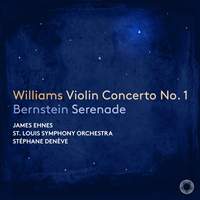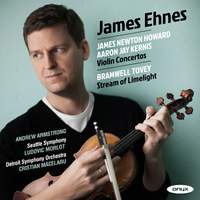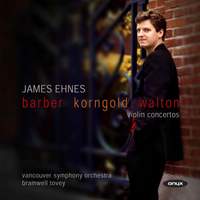Interview,
James Ehnes on John Williams and Leonard Bernstein

Canadian violinist James Ehnes has an extraordinarily broad recorded repertoire, with dozens of outstanding concerto and sonata recordings to his name. His latest album, in collaboration with the St. Louis Symphony Orchestra and conductor Stéphane Denève, pairs works by two giants of twentieth-century American music.
Known primarily for his unparalleled output of film scores over more than six decades, John Williams has also composed a substantial amount of concert works that have gradually earned a justified place in the repertoire of many orchestras. Similarly, Leonard Bernstein enjoyed phenomenal success as a composer of musicals such as West Side Story and Candide, which have arguably eclipsed his accomplishments in other compositional genres.
I spoke to James about what the music of both composers has meant to him throughout his life, his thoughts on the differing stylistic qualities and requirements of writing for film as opposed to the concert hall, and his satisfaction that the historical segregation between such genres is now largely disappearing.
Can you remember when you first encountered the music of John Williams, and how you came to know this concerto in particular?
Probably like most little boys of my age, it was Star Wars! The Empire Strikes Back came out in 1980, which was the first film I saw in the theatre. As a Christmas present my brother and I got the two-LP set of the soundtrack, and we listened to that a lot, so it was really through his film scores. My father was a trumpet professor, and of course John Williams wrote such amazing trumpet parts! But those films of my childhood like Star Wars, Indiana Jones, Superman, these were parts of my life.
It wasn't until quite a few years later that I got to know his instrumental music, and my entrée to that was probably the violin and cello concertos. The violin concerto was a piece that had fascinated me, but that I hadn't actually gotten around to learning until I got a call from Stéphane Denève, who through his work at Tanglewood had become good friends with John Williams. I remember I was on top of a mountain in Bergen, Norway when Stéphane called! He was putting together a project with the Philadelphia Orchestra to do a combination of film and concert music by John, and he asked if I'd be interested in learning the piece. So we got to know it and played it on a couple of occasions. Then this recording project came up in St. Louis, and John came to the rehearsals. It was really quite an incredible thing to work with someone I'd admired for so many years.
When he attended your rehearsals, did he have much input? I know he had already revised the concerto quite a bit in 1998, but did he make any further changes?
Yes, the piece evolved in little ways, and it will probably continue to do so. It's not the message itself that has evolved, but his thoughts on how it can best be communicated. There were a few textual questions where it was enormously helpful to have him there to clarify. I admire John for so many reasons, and I think his music is very alive. In a way there's never really a definitive score because he's always striving to make things better. He seems to like to tinker quite a bit.
The concerto was written largely in response to the death of his first wife, Barbara Ruick, from a brain haemorrhage in 1974. How much do you think that tragedy seeps into the piece and how does that affect your interpretation?
That's a very interesting question: it's clearly a piece that means a very great deal to him, and it's a piece of high emotion, but it's not a piece of just one emotion. I think sometimes people use personal circumstances as an interpretive crutch, and although this piece was undoubtedly influenced by this unfathomable situation in his life, it's not just a piece of darkness or sadness, but also of tremendous beauty and excitement, and there are moments of great tenderness and poise.
In working on it, we certainly felt that it's absolute music, which is interesting coming from someone who has spent so much time where a motif or a melody may be very directly related to something extremely specific. I don't believe that's the case with this piece.
You've just mentioned the absolute nature of this piece: do you think his style is different when he's writing concert music as opposed to the film scores which are much more restrictive in terms of what is required?
I would say the reason why they're both successful is that they're both extremely honest. It's funny because when you really get inside the music, they're not as different as they at first seem. The nature of a melody in his concert music versus his film music is notably different, and that's the surprise for people who come from his film world expecting to hear E.T. or something, and his concert music, while often extremely melodic, is of a very different nature. But the construction and the quite advanced or even strident harmonic language that one finds in the concert music is absolutely there in the film music, not in the big melodies that we all know, but in so many of the important bits of connective tissue in those scores. If you take away the film it's very progressive harmonic stuff. So I think they're both sides of that artistic personality. Every time he writes a new concert piece, everyone keeps wondering, is this going to be the one that sounds like Superman or Jurassic Park? But he is only going to be who he is. And I think that's something you can say about all the greatest composers.
He has talked about his great love for the violin. How much does that come across in his writing, and what are the particular technical challenges in this concerto for you?
It's quite a technically involved piece, but it's written by someone who clearly knows the instrument very well and how to exploit it. When one thinks of what are the elements you want in a successful concerto, there's a certain formula that kind of works. What's a violin good at? It's beautiful melodies, virtuosity, interplay with the orchestra, and all those elements are there. So I think from a violinistic standpoint he really nails it. He writes a piece that is extremely challenging, yet not impractical. And the struggle of the often very difficult execution is tied into the emotional content of the material.
You've paired the concerto with Leonard Bernstein's Serenade from 1954, which came from such a fantastically successful decade for the composer with On The Waterfront, Candide, and of course West Side Story. How does the Serenade sit for you within his output?
I think you could make a very legitimate argument that this might be his most successful concert piece. That's a big statement considering how many great works there are, but I feel like there was this internal struggle with Bernstein's personality, that he always needed to be the smartest and the most fun guy in the room (and by all accounts he was!), and this piece marries those elements so beautifully. In terms of the entertainer side of him you think of West Side Story, but there's also the deeply serious side that is virtuosic from a compositional point of view. There are plenty of brain exercises in this piece, but they're all in the service of telling this wonderful story. And it's a piece that manages to be unique, just one of a kind, and entirely him in the most effortless way. I'm not sure that his concert music is always so effortless, there is maybe a feeling in some of it of wanting to be this or that, and I think this piece just kind of "is". It's such an anomaly and a real joy to play because there's no preparing people for it. It rewards every level of listening: people can come to it never having heard a note and really enjoy it, and then people can go down rabbit holes with the text, trying to find connections that may not even be there. It's been a big part of my repertoire for a long time and I've never tired of digging a little deeper.
You alluded to the fact that in some of his concert music Bernstein perhaps wasn't always so effortless. Do you think there was any frustration on his part that it was pieces like West Side Story that he was best-known for rather than, say, his symphonies?
Of course nothing else ever hit quite like West Side Story, that's just the way it is. That's not a reflection of any sort of diminished talent or anything, but just in terms of the way it hit, nothing compared to that. And his artistic personality was always striving for more. But the Serenade was written at a time where I'm not sure he actually was so interested in searching for anything, because he was still young and just doing what he was doing. I got the impression that he was particularly proud of the piece, although he was not quite sure what people would make of it.
In a letter to his wife Felicia he referred to it as "funny modern music", and in another letter to the composer William Schuman he wrote that the critics would hate it: was that maybe just because it was so different to the hit musicals?
It's funny, the piece was actually premiered at La Fenice in Venice: how unusual is that? It's a fascinating time in musical history: what was anybody expecting out of music then? Post-war, there were these camps coming out all guns blazing in different parts of the world saying: this is the future of music! And he comes out with a piece that is completely impossible to pigeonhole. So yes, I would imagine from his perspective he didn't know what anyone was going to make of it. There are pieces that are products of their time, and any great piece is going to be personal to that composer. Particularly in the twentieth century, there was such pressure to write in this or that style: you wrote your twelve-tone piece, you wrote your neoclassical piece, whatever it may be. But nobody else wrote anything like this, nor could they. Both Bernstein and Williams are two incredibly important figures for so many different reasons. If you think of American music in the second half of the twentieth century, I don't know that you could find anyone more remarkable than these two men.
How much attention should we pay to the programmatic aspects of the piece in terms of the Platonic conversation between Aristophanes, Agathon, Socrates, and others? I believe one of his biographers suggested he might not have had that idea in mind from the very beginning?
Yes, there has been some thought that maybe the piece was fairly far along before he came up with the idea of depicting Plato's Symposium, but there are elements that are so clear that there's no question that there is a relationship. It wasn't like he was trying to pull the wool over anyone's eyes, and there are very obvious connections in the music to the text. For instance, at one point Aristophanes gets the hiccups, and you listen to a particular motif at the beginning of the second movement and think, is that meant to be a hiccup? Maybe it's there, maybe it isn't. If it helps you tell a story as a musician, then it's useful in that sense. I would love to have a conversation with people who knew Bernstein well, as it seems to me almost impossible that there was not some sort of hidden agenda, because you read that story and there are elements that are scandalous even today, never mind in 1954! I love how he talks about it quite casually, saying "of course we all know Plato says this or that, don't we", when he knew perfectly well that people had not really read it, that they were totally full of it and unaware of the more sexual elements and things like that. There was definitely a part of him that was waiting to see if anyone would call him out on it, which I find highly amusing.
Both composers have written for film and for the concert hall, and of course you have recorded another concerto by a film composer, James Newton Howard. Do you have any more plans in that regard?
Well, James is actually writing me a second concerto right now, and that will be premiered in Washington, D.C. in about a year. And a piece that plays a very big part in my life is the Korngold concerto, which of course is based on so many of his film melodies. I think in this day and age it's kind of ridiculous to look back at the way music was segregated for so long. There's no reason for that and I think it's great that we can now say there isn't that sort of stigma attached to it because, how silly, right? Why would you not embrace a branch of music that is so unquestionably successful? One thing that fascinates me about the greatest film composers is that, when you have people that basically do that for a lot of their life, it's amazing to me that they can come out with a concert piece that has such brilliant structure, because there's such a difference. You might write something for a film and then that scene gets edited or cut, and your music gets pulled this way or that, so when I initially got into James Newton Howard's first concerto, that was the thing that was so extraordinary to me, that the form and proportions were so perfect for someone who most of the time has to write things where he's told, "we need thirty seconds of a romance scene and then forty-five seconds of a giant lizard coming out of a drainpipe!" To have that mastery over concert form and proportion I think is really special.
James Ehnes (violin), St. Louis Symphony Orchestra, Stéphane Denève
Available Formats: CD, MP3, FLAC, Hi-Res FLAC
James Ehnes (violin), Seattle Symphony Orchestra, Detroit Symphony Orchestra, Ludovic Morlot, Cristian Măcelaru
Available Formats: CD, MP3, FLAC, Hi-Res FLAC
James Ehnes (violin), Vancouver Symphony Orchestra, Bramwell Tovey
Available Formats: CD, MP3, FLAC





